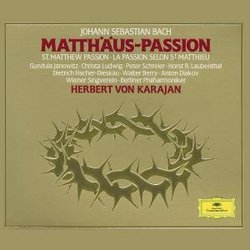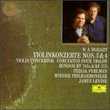| All Artists: Dietrich Fischer-Dieskau, Johann Sebastian Bach, Herbert von Karajan, Walter Hagen-Groll, Horst Gobel, Berlin National Cathedral Choir, Berlin Philharmonic Orchestra, Wolfgang Meyer, Wolfgang Sebastian Meyer, Gundula Janowitz, Horst R. Laubenthal, Peter Schreier Title: Bach: Matth�us-Passion Members Wishing: 0 Total Copies: 0 Label: Deutsche Grammophon Release Date: 10/25/1990 Genre: Classical Styles: Opera & Classical Vocal, Historical Periods, Baroque (c.1600-1750), Modern, 20th, & 21st Century, Sacred & Religious Number of Discs: 3 SwapaCD Credits: 3 UPC: 028941978929 |
Search - Dietrich Fischer-Dieskau, Johann Sebastian Bach, Herbert von Karajan :: Bach: Matth�us-Passion
 | Dietrich Fischer-Dieskau, Johann Sebastian Bach, Herbert von Karajan Bach: Matth�us-Passion Genre: Classical
|
Larger Image |
CD DetailsSimilar CDs
|
CD ReviewsIncredibly moving Derek Lee | St. Paul, MN USA | 07/13/2004 (5 out of 5 stars) "I strongly encourage you to listen to this recording objectively, eliminating from mind any prejudices you might have against Karajan and the assumption that this music should only be played in a "period" style. If you do so, I hope (nay, expect) you will be as pleased with this recording as I was. I cannot listen to the closing chorus, or the chorale after the death of Jesus, without tears welling up in my eyes. With this recording, Karajan is the anti-Gardiner par excellence (though Gardiner hadn't come on the scene yet in 1973, my point is clear I hope). Occasionaly the execution is a bit on the muddy side (more due to the, at that time, somewhat less than ideal Wiener Singverein than anything else), but the devotion, the spirituality, and the sheer drama is always present. The soloists are excellent, both vocally and characterization-wise. Fischer-Dieskau is overpowering as Christ, conveying nobility and suffering as well as I can imagine. Schreier is wonderful as the Evangelist, deeply involved in the story, Janowitz and Ludwig are vocally beautiful as usual, Berry is deeply moving (if you are not affected by the divine peace of his "Mache dich mein Herze rein" your doctor should examine your heart to make sure it isn't a block of granite), and even the lesser known Leubenthal and Diakov acquit themselves very well. I have no hesitation in recommending this to those who are looking for their first St. Matthew Passion. I do admit that I have not yet listend to Klemperer's recording, which I suspect is even better, but if the Klemperer did not exist, I would be perfectly happy with this." A truly great work! Adam M Bruss | Michigan | 01/14/2002 (4 out of 5 stars) "The St. Matthew's Passion by J.S. Bach is quite possibly my favorite classical work. Bach's musical genius is the standard for the study of music in the world today. The first thing that strikes the listener on this recording is a wonderfully powerful and thickly textured orchestral introduction to the opening chorus as performed by one of the greatest orchestras in the world, the Berlin Philharmonic. They are under the baton of the late Herbert von Karajan, one of the greatest conductors of this century. His interpretations are drastically different than those of other great conductors, Leonard Bernstein for example, but they are masterful all the same. The Chorus in this recording is unfortunately not up to the standards of the orchestra and soloists. Tuning is the foremost issue. However, to their credit, they followed Karajan's musical perspective fairly well, and there were even moments when they turned in a very effective and moving performance. The soloists, however, are another story alltogether. This recording presents to the listener an all-star cast of singers. Dietrich Fischer-Dieskau, Peter Schrier (Screamer), Christa Ludwig, Gundula Janowitz, Walter Barry, and even the lesser known bass and tenor, Anton Diakov and Horst Laubenthal really make this recording one of the greatest of this passion. Dieskau, probably the greatest, most prolific baritone of this century, played an inspiring Jesus. Schrier, the Evangelist, shows on this recording why he was considered the quintessential Evangelist (It was also his favorite role to sing). Walter Barry, the underestimated bass sings the recitative/arias with beautiful tone and masterful musicality. Christa Ludwig, the famous alto/contralto sings the alto recit/arias with her enveloping, smooth, deep voice. Her phrasing is particularly excellent. Finally, Gundula Janowitz brings her unique soprano sound to the soprano recit/arias. Her voice is an aquired taste for some, but I would encourage everyone to explore her recordings more. Her vibrato may seem strange, but as a trained singer, I can assure you her voice is very free and quite the ideal for this style. Perhaps her best work is in the aria, "Aus Liebe will mein Heiland Sterben". This recording is one of my favorites in my collection. The Orchestra is phenominal as are the soloists, and such a thing as the chorus singing out of tune can certainly be overlooked in the context of such a great performance (After all, most choruses do anyway). I HIGHLY recommend you add this timeless classic to your collection." This recording may convert you. Sunan Peebles | 04/12/2000 (5 out of 5 stars) "This is a wonderfull recording of a piece whose inspired nature is not lost on Karajan and his performers in their interpretation. This, if nothing else, is a passionate recording. One almost sees the gospel of Matthew unfold before them as they listen to Bach's divine music so excellently presented. Throw out your copies of the Gardiner or the Richter they are worthless when compared to this."
|

 Track Listings (29) - Disc #1
Track Listings (29) - Disc #1


